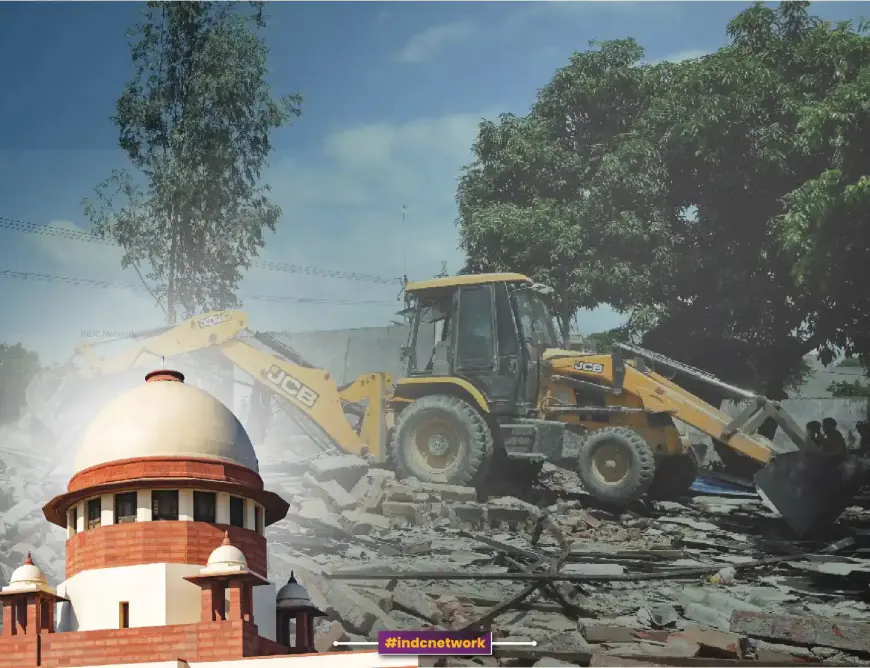Bulldozers Can’t Be Judges: Supreme Court’s Bold Stand on Unlawful Demolitions to Protect Citizen Rights
In a landmark ruling, the Supreme Court of India condemned the practice of arbitrary demolitions by state authorities, declaring that "bulldozer justice" has no place in a society governed by law. A bench led by Chief Justice D.Y. Chandrachud established mandatory guidelines to prevent abuse of power, ensuring that all demolitions must follow strict legal procedures, including surveys, notices, and opportunities for objections. Violations will result in disciplinary and criminal actions against officials. This decision, born out of a case in Uttar Pradesh, underscores the court’s commitment to protecting citizens’ rights and property from unlawful state reprisal.

INDC Network : New Delhi : Supreme Court’s Stand Against “Bulldozer Justice”: Guidelines on Protecting Citizens from Arbitrary Demolitions
A Historic Verdict in the Fight for Citizen Rights
In an era marked by rising instances of demolitions, the Supreme Court of India has taken a firm stand against what it terms "bulldozer justice," a practice increasingly criticized for targeting protesters, minorities, and government critics. In a groundbreaking decision, a bench led by Chief Justice of India (CJI) D.Y. Chandrachud declared that this form of demolition, often executed without due process, has no place in a society governed by law.
The Supreme Court’s directive mandates procedural safeguards to prevent state authorities from abusing their power, emphasizing that citizens’ voices must not be silenced by threats of property destruction. CJI Chandrachud, in one of his final landmark judgments before retirement, outlined six critical steps that state authorities must follow to ensure justice and transparency in demolition cases.
Mandatory Safeguards to Prevent Misuse of Power
The court established six essential procedures, each designed to maintain accountability, fairness, and transparency in the demolition process. These guidelines underscore the necessity of adherence to due process and aim to prevent the weaponization of demolitions. According to the new directives:
-
Verification of Land Records and Maps: Authorities must confirm land ownership and boundaries through thorough examination of records to avoid wrongful demolition.
-
Conduct Proper Surveys: Before any action, accurate surveys should be conducted to identify encroachments.
-
Issue Written Notices: Alleged encroachers must be informed in writing, a crucial step to ensure they have an opportunity to respond.
-
Consider Objections and Provide Reasoned Orders: Citizens must be allowed to raise objections, which authorities must address through formal, documented responses.
-
Allow Reasonable Time for Voluntary Removal: Citizens should be granted adequate time to voluntarily remove alleged encroachments before demolition.
-
Acquire Additional Land Legally if Needed: If the project requires further land, authorities must acquire it through lawful means rather than arbitrary seizure.
The bench, which included justices J.B. Pardiwala and Manoj Misra, warned that officials ignoring these guidelines could face disciplinary actions and criminal charges, establishing a strong deterrent to discourage misuse of authority.
Case Study: The Demolition of Journalist Manoj Tibrewal Akash’s Ancestral Home
This landmark decision traces its roots to the 2019 demolition of journalist Manoj Tibrewal Akash's ancestral house in Uttar Pradesh’s Maharajganj district. Authorities justified the demolition by claiming the need to expand a National Highway. However, investigations revealed serious procedural lapses. The National Human Rights Commission (NHRC) found that while only a small portion of the property allegedly encroached on government land, authorities destroyed additional areas without proper documentation, notices, or records. A public announcement through drum-beating was the only notice Tibrewal received.
Tibrewal claimed that the demolition was retaliatory after his father called for a probe into alleged irregularities in a ₹185 crore road construction project. Though the Supreme Court did not directly address this allegation, it stressed the perils of using demolitions as selective punishment.
Accountability Measures for Violating Officials
To uphold these new standards, the court ordered the Uttar Pradesh government to pay ₹25 lakh in interim compensation to Tibrewal. Additionally, the chief secretary was directed to initiate disciplinary actions and file criminal charges against officials involved in the unauthorized demolition. This judgment demands that officials face consequences for illegal actions, underscoring the principle of “public accountability for public officials.”
The chief secretary must also investigate other demolitions carried out without due process in the region and ensure that FIRs are lodged and investigated by the CB-CID as directed by the NHRC. The court set a one-month deadline for the state to implement the guidelines and a four-month period for concluding disciplinary proceedings.
Sending a Clear Message Across India
With this ruling, the Supreme Court has sent a clear message that arbitrary demolitions violate citizens' property rights under Article 300A of the Constitution. The court affirmed that while unlawful encroachments on public property are not condoned, citizens' rights to protection from unauthorized demolitions must be upheld.
Justice Chandrachud's bench has ordered that copies of these guidelines be sent to the chief secretaries of all states and Union territories for immediate implementation. These instructions come at a crucial time, as another bench led by Justice Bhushan R. Gavai has recently reserved orders on similar cases involving arbitrary demolitions across various states.
Implications of the Verdict
The judgment reflects the Supreme Court’s emphasis on curbing the misuse of demolitions as a tool for selective reprisal and reinforces citizens' rights to fair treatment under the law. In an era where bulldozers have become potent symbols of power, often used against vulnerable groups without proper legal channels, this ruling champions the principle that no citizen should be subjected to justice meted out by heavy machinery.
By mandating strict protocols, the Supreme Court has set a legal precedent aimed at preventing state excesses and reinforcing the rule of law.









